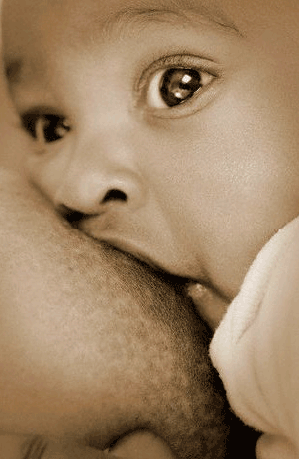Despite difficulties, natural and human, breastfeeding remains the best and healthiest for a baby. There are also the ripple effects of raising a baby’s intelligence level and bonding between mother and child. However, some women present counter arguments, citing their own upbringing. Woman Editor, TEMITOPE DAVID-ADEGBOYE, examines the challenges faced by nursing mothers as well as solutions in this World Breastfeeding Week, which is celebrated yearly between August 1 and 7 in more than 170 countries to encourage breastfeeding and improve the health of babies around the world.
Before Esther Britto had her first baby she frowned at mothers who stopped breastfeeding before the age of one. She desired to indulge her baby until he or she clocked two, by which time she would be thinking of having another child.
But she could not realise this dream.
She had previously noticed her inverted nipples and thought they would naturally pop out when it was time to breast feed.
Her gynaecologist did not notice this abnormality at the early stage of pregnancy; when he finally did, he advised the husband to rub the nipples frequently. But the heavily pregnant Britto could not stand the pain.
Natural breastfeeding difficulties
The way a woman’s nipples are shaped can have a big impact on breastfeeding.
Most nipples are shaped perfectly to fit a baby’s mouth, but some women have flat or inverted nipples that make it difficult for a baby to get a firm grip. The baby’s mouth does not latch on properly to get enough milk. This can decrease milk production, which in turn leads to less suckling.
This was Britto’s plight. Feeding time for her tot was not pleasant. She had no choice than to introduce milk formula.
“I didn’t like the idea but it was obvious the boy was struggling to feed properly. I bought a pump which the doctor said I should use before feeding time but it was of little help,” Britto recounted.
“If and when we managed to bring out one nipple and he latched on to it, anytime he took a little rest before continuing, the nipple would have folded up again.
“Sometimes, when I tried to breastfeed him he would not open his mouth even when it was apparent he was hungry. I had to buy a milk formula, and that he preferred, judging by the way he finished a bottle in minutes.”
Job difficulties
For Eno Bassey, as much as she would have loved to do exclusive breastfeeding for her daughter, she was incapacitated because of the nature of her job – banking. She left for work early and returned late in the evening.
‘Expressing’ breast milk in a bottle would have been an option, however frequent power outage would not allow for safe and hygienic keeping.
Bassey also had to introduce her daughter to artificial milk. She breastfed her at weekends but still felt bad she ever gave the baby milk formula before she was six months old.
The best, the healthiest
Experts say breastfeeding is the best and healthiest way to feed a child. It is highly nutritious, yet cheap and convenient.
However, breastfeeding is threatened by daily economic demands on women, even for those who believe paediatricians who link it to intelligence.
Breast milk – which is 90 per cent water – consists of proteins, non-protein nitrogen compounds, lipids, oligosaccharides, vitamins, minerals, hormones, enzymes, growth factors and protective agents, with 10 per cent solids for energy and growth.
In addition to containing all the vitamins and nutrients a baby needs in the first six months of life, breast milk is packed with disease-fighting substances that protect a baby from illness.
Breastfeeding linked to intelligence
Various researches have also found a connection between breastfeeding and cognitive development.
In a study of more than 17,000 infants followed from birth to six and a half years, researchers concluded from intelligent quotient (IQ) scores and other intelligence tests that prolonged and exclusive breastfeeding significantly improves cognitive development.
Counter arguments
Some mothers dispute this, however. They argue that their own mothers did not exclusively breastfeed them, yet they are not dullards and do not fall ill frequently.
Others say breast milk sometimes is not filling for some children as they age, hence the need for milk formula.
Lolade, a mother of two teenagers, said “although I tried to breastfeed my children well till one was nine months old and the other one year old, my mother died a few months after I was born and I was fed with milk formula till I started taking solids.
“Growing up, I can’t recollect suffering from any serious illness and I have always been an above average student.
“This is not to discourage women from breastfeeding their babies.”
Another factor which prevents mothers from breastfeeding exclusively is the structure of the workplace which often sabotages a woman’s plan to continue breastfeeding when maternity leave ends.
A report in 2005 showed that only 10 per cent of mothers who work full time breastfeed at six months.
“I breastfed my first child for five months, but I was working at the time and found it really difficult to express breast milk at work,” said Mary Ayonote.
WHO recommendations
Despite the challenges, the World Health Organisation (WHO) recommends that breastfeeding remains the best for children.
WHO says
• Breast milk is safe and contains antibodies that help protect infants from common childhood illnesses.
• Breast milk is readily available and affordable.
• People breastfed as babies are less likely to be overweight or obese later in life.
• Those breastfed as babies may be less prone to diabetes and perform better in intelligence tests.
• If every child in the world were breastfed, some 220,000 lives could be saved each year.
• Recent studies in Ghana, India and Peru showed that infants not breastfed were 10 times more likely to die than those predominantly or exclusively breastfed.
Benefits moms, babies
The baby is not the only one who benefits from breastfeeding. Mothers benefit from the closeness with their child as well.
Breastfeeding provides mother and child a quiet, relaxed time to bond. Skin-to-skin contact can boost the mother’s oxytocin level.
Breastfeeding is also linked to a lower risk of diabetes, breast cancer, ovarian cancer, postpartum depression. It also lowers healthcare cost as breastfeeding babies rarely fall sick, thus mothers have less work to do.
Solutions to flat, inverted nipples
Tomi Bamgboje, a paediatrician, says women with flat or inverted nipples can nurse just fine with the right care and attention.
“You don’t need to do anything ahead of time since most flat and inverted nipples perform their job as well as any other nipples once breastfeeding begins,” she counselled.
However, some women need a little help to get the job done. To the rescue are breast shells, a plastic worn over the nipples that gradually draws them out when gentle and painless pressure is applied.
“You can start using them before your baby is born but it’s really not necessary – wearing them between feedings should be enough to draw the nipples out to an easily suckled position,” Bamgboje added.
Another option is drawing out the nipples with a breast pump immediately before nursing (do not pump more than a few times or else milk will spill).
Bamgboje warned that “breast shells may cause sweating and rashes and can be pretty conspicuous” (particularly if you are wearing a thin shirt).
Plastic devices designed to be worn during feedings to draw out the nipple are not recommended by lactation specialists because they can prevent the baby from grasping the nipple properly, setting up a longer-term problem of inadequate milk supply and demand.













